Related Research Articles
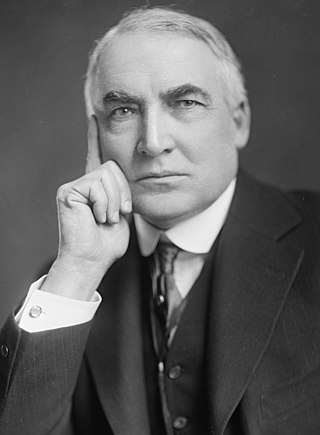
The 1920 United States presidential election was the 34th quadrennial presidential election, held on Tuesday, November 2, 1920. In the first election held after the end of the First World War and the first election after the ratification of the Nineteenth Amendment, Republican Senator Warren G. Harding of Ohio defeated Democratic Governor James M. Cox of Ohio. It was also the third presidential election in which both major party candidates were registered in the same home state; the others have been in 1860, 1904, 1940, 1944, and 2016.
A resistance movement is an organized group of people that tries to resist the government or an occupying power, causing disruption and unrest in civil order and stability. Such a movement may seek to achieve its goals through either the use of violent or nonviolent resistance, or the use of force, whether armed or unarmed. In many cases, as for example in the United States during the American Revolution, or in Norway in the Second World War, a resistance movement may employ both violent and non-violent methods, usually operating under different organizations and acting in different phases or geographical areas within a country.
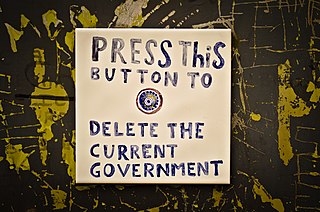
An anti-establishment view or belief is one which stands in opposition to the conventional social, political, and economic principles of a society. The term was first used in the modern sense in 1958, by the British magazine New Statesman to refer to its political and social agenda. Antiestablishmentarianism is an expression for such a political philosophy. Anti-establishment positions vary depending on political orientation. For example, during the protests of 1968, anti-establishment positions generally emerged from left-wing, socialist, and anarchist circles. In the 2010s however, anti-establishment positions generally emerged from right-wing populist circles.
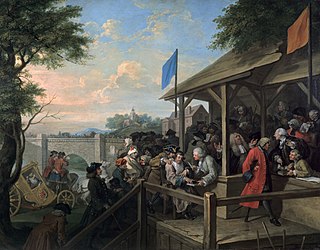
Political colours are colours used to represent a political ideology, movement or party, either officially or unofficially. They represent the intersection of colour symbolism and political symbolism. Politicians making public appearances will often identify themselves by wearing rosettes, flowers, ties or ribbons in the colour of their political party. Parties in different countries with similar ideologies sometimes use similar colours. As an example the colour red symbolises left-wing ideologies in many countries, while the colour blue is often used for conservatism, the colour yellow is most commonly associated with liberalism and right-libertarianism, and Green politics is named after the ideology's political colour. The political associations of a given colour vary from country to country, and there are exceptions to the general trends, for example red has historically been associated with Christianity, but over time gained association with leftist politics, while the United States differs from other countries in that conservatism is associated with red and liberalism with blue. Mass media has driven a standardization of colour by political party, to simplify messaging, while historically the colour a candidate chose to identify with could have been chosen based on other factors such as family or regional variations.

Student activism or campus activism is work by students to cause political, environmental, economic, or social change. In addition to education, student groups often play central roles in democratization and winning civil rights.
A provisional government, also called an interim government, an emergency government, a transitional government or provisional leadership, is a temporary government formed to manage a period of transition, often following state collapse. Provisional governments are generally appointed, and frequently arise, either during or after civil or foreign wars, or during difficult times such as during invasion, economic crisis, or widespread infiltration of saboteurs and counter-revolutionaries such as during the French Revolution.

The Communist Party of Ireland (CPI) is a Marxist–Leninist party, founded in 1933 and re-founded in 1970 and active in the Republic of Ireland and Northern Ireland. It rarely contests elections and has never had electoral success. The party is a member of the International Meeting of Communist and Workers' Parties.

"¡El pueblo unido jamás será vencido!" is a Chilean protest song, whose music was composed by Sergio Ortega Alvarado and the text written in conjunction with the Quilapayún band. Together with the song "Venceremos", also by Ortega, it is one of the most successful songs of the Nueva canción chilena movement. The theme has a marching rhythm, highlighting its chorus, which is a shout or slogan with only percussion. The song has been used in various protests around the world against either left or right-wing dictatorships, most of which have no direct connection to the Chilean coup or Latin America. The lyrics have been adapted or translated into many languages.

"Sí, se puede" is the motto of the United Farm Workers of America, and has since been taken up by other activist groups. UFW co-founder Dolores Huerta created the phrase in 1972 during César Chávez's 25-day fast in Phoenix, Arizona. "Sí se puede" has long been a UFW guiding principle that has inspired the accomplishment of goals. The phrase is a federally registered trademark of the UFW. It has been widely adopted by other labor unions and civil rights organizations, and drew widespread political and media attention as a rallying cry during the U.S. immigration reform protests.
Inquilab Zindabad is a Hindustani phrase, which translates to "Long live the revolution". Although originally the slogan was used by leftists in British India, today it is used in India and Pakistan by civil society activists during protests as well as by politicians from various ideological backgrounds.
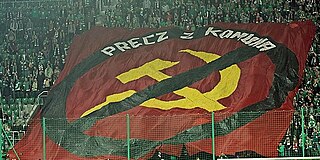
Anti-communism is political and ideological opposition to communist beliefs, groups, and individuals. Organized anti-communism developed after the 1917 October Revolution in the Russian Empire, and it reached global dimensions during the Cold War, when the United States and the Soviet Union engaged in an intense rivalry. Anti-communism has been an element of many movements and different political positions across the political spectrum, including anarchism, centrism, conservatism, fascism, liberalism, nationalism, social democracy, socialism, leftism, and libertarianism, as well as broad movements resisting communist governance. Anti-communism has also been expressed by several religious groups, and in art and literature.
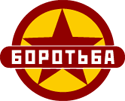
The Association "Struggle" is a Stalinist organization operating in Odesa, Kharkiv, Kyiv, and Dnipro in Ukraine.

The political slogan "Workers of the world, unite!" is one of the rallying cries from The Communist Manifesto (1848) by Karl Marx and Friedrich Engels.

"Make America Great Again" is an American political slogan and movement most recently popularized by Donald Trump during his successful 2016 presidential campaign. "MAGA" is also used to refer to Trump's political base, or to an individual or group of individuals from within that base. The slogan became a pop culture phenomenon, seeing widespread use and spawning numerous variants in the arts, entertainment and politics, being used by both those who support and those who oppose Trump's presidency. Originally used by Ronald Reagan as a campaign slogan in his 1980 presidential campaign, it has since been described as a loaded phrase. Multiple journalists, scholars, and commentators have called the slogan racist, regarding it as dog-whistle politics and coded language.
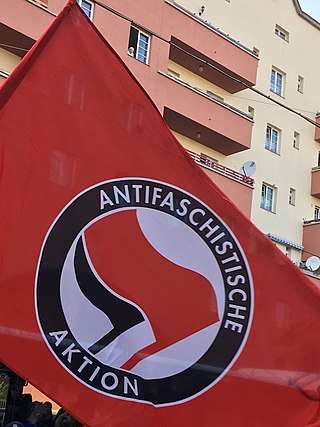
Post–World War II anti-fascism, including antifa groups, anti-fascist movements and anti-fascist action networks, saw the development of political movements describing themselves as anti-fascist and in opposition to fascism. Those movements have been active in several countries in the aftermath of World War II during the second half of the 20th and early 21st century.

The mottos of Francoism are mottos which encapsulate the ideals of the Francoist dictatorship. Although the regime had many ideological influences, it employed Falangism in its popular movements. Falangist ideology was easily incorporated in the creation of mottos as it is believed to demonstrate a certain reluctance towards political agendas, and to favour empiricism, taking action, and the simplification of ideas.
References
- ↑ Chattopadhyay, Suhrid Sankar (October 18, 2019). "CPI(M) kick-starts centenary celebrations with call to resist communal forces". frontline.thehindu.com/.
- ↑ "Closing press conference by NATO Secretary General Jens Stoltenberg at the end of the 2023 NATO Summit in Vilnius". NATO . 2023-07-12. Retrieved 2023-11-17.
- ↑ Janetsky, Megan (2021-07-13). "'Patria y Vida' – Homeland and Life – Watchwords in Cuba's Protests". The New York Times. ISSN 0362-4331 . Retrieved 2021-07-18.
- ↑ Roberts, Robert North, et al. "Compassionate Conservatism". Presidential Campaigns, Slogans, Issues, and Platforms: The Complete Encyclopedia, vol. 1: Slogans, Issue, Programs, Personalities, and Strategies, Greenwood, 2012, pp. 98–100. Gale eBooks
- ↑ Roberts, Robert North, et al. "United We Stand America." Presidential Campaigns, Slogans, Issues, and Platforms: The Complete Encyclopedia, vol. 1: Slogans, Issue, Programs, Personalities, and Strategies, Greenwood, 2012, p. 503. Gale eBooks.
- ↑ "Words Fail; Miami Cops Get Tough with Negro Thugs". Standard-Speaker. December 27, 1967. p. 1. Retrieved May 29, 2020– via Newspapers.com.

- ↑ "How three violent days gripped a black Miami neighborhood as Nixon was nominated in 1968 – The Washington Post". The Washington Post .
- ↑ Roberts, Robert North, et al. "Whip Inflation Now (WIN)." Presidential Campaigns, Slogans, Issues, and Platforms: The Complete Encyclopedia, vol. 1: Slogans, Issue, Programs, Personalities, and Strategies, Greenwood, 2012, pp. 531–532. Gale eBooks
- ↑ Gamble, Andrew (3 August 2018). "Taking back control: the political implications of Brexit". Journal of European Public Policy . 25 (8): 1215–1232. doi:10.1080/13501763.2018.1467952. ISSN 1350-1763. S2CID 158602299.